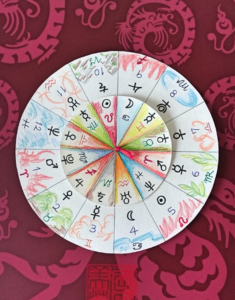Astrology is not science.
In the Western history, astronomy and astrology were intertwined as the same subject until the 17th century. In the beginning of the Common Era (the Gregorian calendar), mathematician Claudius Ptolemy recorded that “there were two forms of astronomy, one which dealt with the movement of the stars, the other (which we would call astrology) with their effects or significance” (Campion, 2008, pp x). Through a few centuries of the Age of Enlightenment (the Age of Reason), the astrological quality of the subject was completely dropped from the subject in order to reason the supremacy of ‘science’ by contrasting dichotomies, science or pseudoscience, heliocentric or geocentric, nature or magic, and so on.
Astrology is not religion.
“Do you believe in astrology?” is not an appropriate question. Basically, astrology should not require ‘belief’ or psychic ability to understand it. It actually demands heavy intellectual ability. It is based on “the movement of the stars”. In other words, the massive accumulation of physical observations, records and analysis of corresponding celestial and social events by stargazers (astronomers and astrologers) are the foundation of current astrology as it was in centuries ago. Thus, in order to understand astrology, it is required to gain basic astronomical knowledge in both geocentric and heliocentric perspectives. Modern astrologers precisely know the gaps of these different perspectives.
To me, astrology is a highly intellectualised almanac or calendar. Traditional farmer’s almanacs are usually based on the Sun and the Moon only. (In a way, this is relevant for our physical day-to-day living.) In current astrology, at least 10 planets are explored. That’s why astrology requires certain studies and skills to decode the entanglement of the stars and influences to us. Perhaps it is more relevant to ask “Do you utilise astrology for your daily life?”
Approach of modern astrology
In ancient times and even modern days, astrology has been used as a divination to predict the future, namely fortune telling. Astrologers can tell you dates and events likely to happen because they learned the database of the past, not because they see things through the crystal ball. It is an unavoidable fact that the more skilled astrologers are, the more intuitive they become. But the basics of astrology is based on solid data.
Simultaneously, astrology looks at not only the external events or conditions but also profoundly looks through the inner qualities, emotions and moods of a matter or a person. Perhaps this aspect of astrology induces people’s feeling of awe as well as skepticism. In the past, it has been a tool for self-reflection and psychoanalysis. In fact, it is known among astrologers that psychiatrist Carl Jung utilised astrology in his psychoanalysis, particularly for difficult cases (Buck, 2018, 211-212). The usage as a psychoanalytic tool is more and more explored and re-discovered by modern astrologers.
‘Astrologer’
I don’t call myself an ‘astrologer’ instead I call myself an ‘astrological practitioner’. Astrologers require massive learnings, practices and experiences. I am not there yet though I have learned the language of astrology and consulted people. For the sake of convenience, however, I include myself to astrologers as ‘we’ when I discuss matters as a person who knows the language and its world.
References
Buck, Stephanie. (2018). Hiding in plain sight: Jung, astrology, and the psychology of the unconscious. The Journal of Analytical Psychology. 2018, 63, 2, 207-227. DOI: https://doi.org/10.1111/1468-5922.12394
Campion, Nicholas. (2008). Introduction. The Dawn of Astrology, A cultural History of Western Astrology. Volume I: The Ancient and Classical Worlds. Continuum Books, London, UK.
Image: Wheels of a Western astrology chart made by me.
